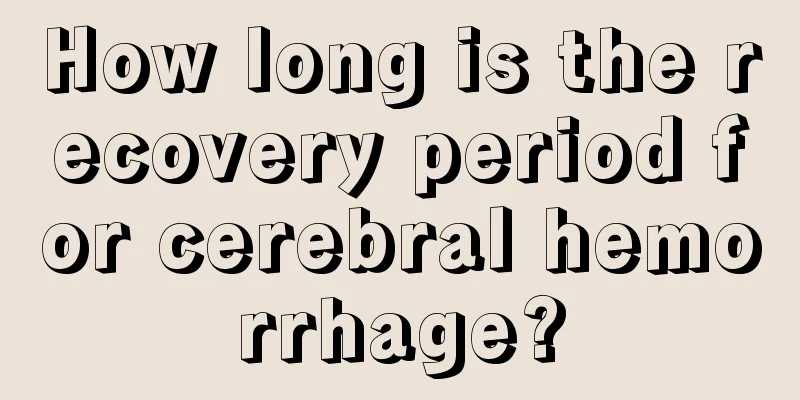How long is the recovery period for cerebral hemorrhage?

|
Cerebral hemorrhage is a common disease among the elderly. It will have a great impact on the physical health of the elderly. It will also easily lead to some other complications, and even cause diseases such as cerebral edema. The recovery period is different depending on the physical condition and illness of different people. Generally, the recovery period after cerebral hemorrhage is 3-5 months. Pay more attention to rest and diet. How long does it take to recover from a cerebral hemorrhage? Full recovery usually takes about half a year. Dizziness is a symptom of insufficient blood flow to the brain. It is recommended to pay attention to rest, avoid fatigue, emotional excitement and staying up late. At the same time, pay attention to monitoring blood pressure, controlling blood pressure, and ensuring that blood sugar and blood lipids meet standards. Sequelae Symptoms of sequelae of cerebral hemorrhage. The most common sequelae of cerebral hemorrhage is hemiplegia, which is manifested as decreased muscle strength, difficulty in movement or complete inability to move the limbs on one side, often accompanied by sensory impairment of the limbs on the same side, such as decreased or complete loss of sensation of cold, heat, pain, etc. Sometimes it is accompanied by ipsilateral visual field loss. The common sequelae of cerebral hemorrhage mainly manifest in three aspects. 1) Mental and intellectual disorders: Large-scale or repeatedly recurring cerebral hemorrhage accidents may leave mental and intellectual disorders, such as personality changes, pessimism, depression, mental depression, irritability, etc. 2) Aphasia: Aphasia caused by sequelae of cerebral hemorrhage mainly includes three aspects: 1. Motor aphasia is characterized by the patient being able to understand what others say but unable to express his or her own ideas. The lesions involve the dominant hemisphere and the corresponding subcortical white matter areas; 2. Sensory aphasia has no language expression disorder, but the patient cannot understand what others say, nor what he says. The patient answers questions irrelevantly and talks to himself. The lesion affects the dominant hemisphere. 3. Anomia is manifested as being able to tell the purpose of an object when seeing it, but not being able to name it. The lesions involve the posterior part of the middle temporal gyrus of the dominant hemisphere or the temporo-occipital junction. 3) Other symptoms Other symptoms of sequelae of cerebral hemorrhage include: headache, dizziness, nausea, insomnia, nightmares, inattention, tinnitus, blurred vision, sweating, palpitations, unsteady steps, neck pain, fatigue, weakness, loss of appetite, memory loss, dementia, depression, etc. Symptoms of sequelae of cerebral hemorrhage The most common sequelae of cerebral hemorrhage is hemiplegia, which is manifested as decreased muscle strength, difficulty in movement or complete inability to move the limbs on one side, often accompanied by sensory impairment of the limbs on the same side, such as decreased or complete loss of sensation of cold, heat, pain, etc. Sometimes it is accompanied by ipsilateral visual field loss. The common sequelae of cerebral hemorrhage mainly manifest in three aspects. 1) Mental and intellectual disorders: Large-scale or repeatedly recurring cerebral hemorrhage accidents may leave mental and intellectual disorders, such as personality changes, pessimism, depression, mental depression, irritability, etc. 2) Aphasia Post-stroke aphasia mainly includes three aspects. 1. Motor aphasia is characterized by the patient being able to understand what others say but unable to express his or her own meaning; 2. Sensory aphasia has no language expression disorder, but the patient cannot understand what others say, nor what he says, and the patient may answer questions irrelevantly and talk to himself. 3. Anomia is manifested in that when one sees an object, one can tell its purpose but cannot name it. 3) Other symptoms Other symptoms of sequelae of cerebral hemorrhage include: headache, dizziness, nausea, insomnia, nightmares, inattention, tinnitus, blurred vision, sweating, palpitations, unsteady steps, neck pain, fatigue, weakness, loss of appetite, memory loss, dementia, depression, etc. |
<<: What is the cause of sudden cerebral hemorrhage?
>>: Is severe coma caused by cerebral hemorrhage serious?
Recommend
Does running help you sleep?
Running can make people's bodies tired and in...
What should I do if I have a runny nose due to a cold?
Colds are very common and are minor illnesses. Ev...
Which hospitals treat advanced liver cancer?
Liver cancer has become the biggest killer of hum...
Headache and heart discomfort
There are many symptoms of physical discomfort, s...
What foods can prevent pancreatic cancer
The cause of pancreatic cancer is not yet clear. ...
Are disposable paper cups toxic?
With the continuous development of science and te...
What causes cracks on teeth?
If there are cracks on your teeth, you should pay...
How does bladder cancer metastasize in the late stage? Dietary considerations for bladder cancer
The bladder is a very important part of our human...
Postoperative treatment plan for colorectal cancer
What is the treatment plan for colorectal cancer ...
What does hair loss have to do with?
Hair loss is a phenomenon that many people encoun...
What is the relationship between lung tumors and lung cancer? Lung cancer is included in lung tumors
Lung tumors and lung cancer are closely related. ...
Why does a bee sting kill a person? Is this statement true
I often hear old people say that bees should not ...
Can I have a nose job if I have rhinitis?
Rhinitis patients are troubled by nasal discomfor...
What does it mean when a girl has rabbit teeth
When it comes to rabbit teeth, many of our friend...
What is pectin
What is pectin? Many people are not very clear ab...









